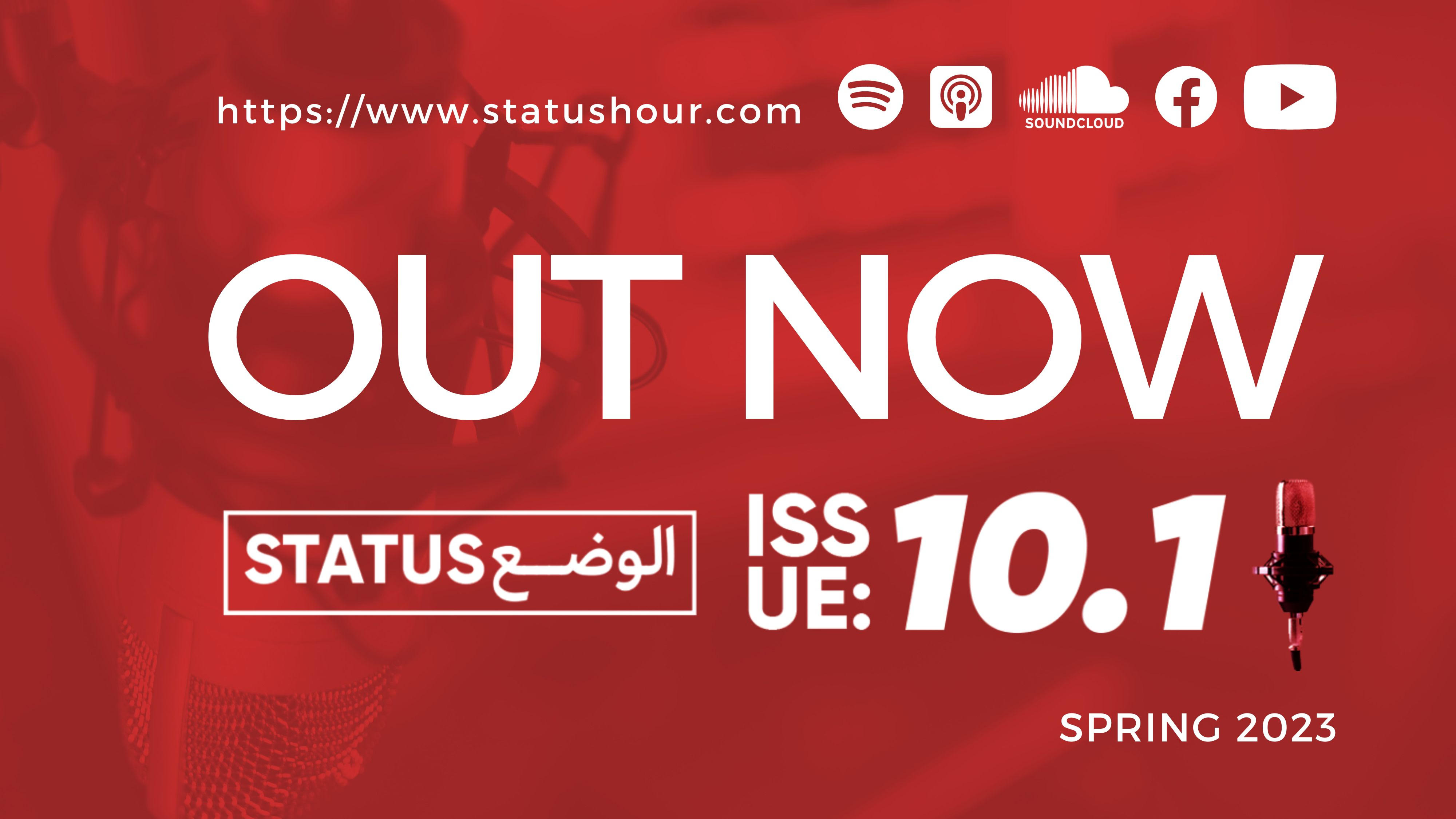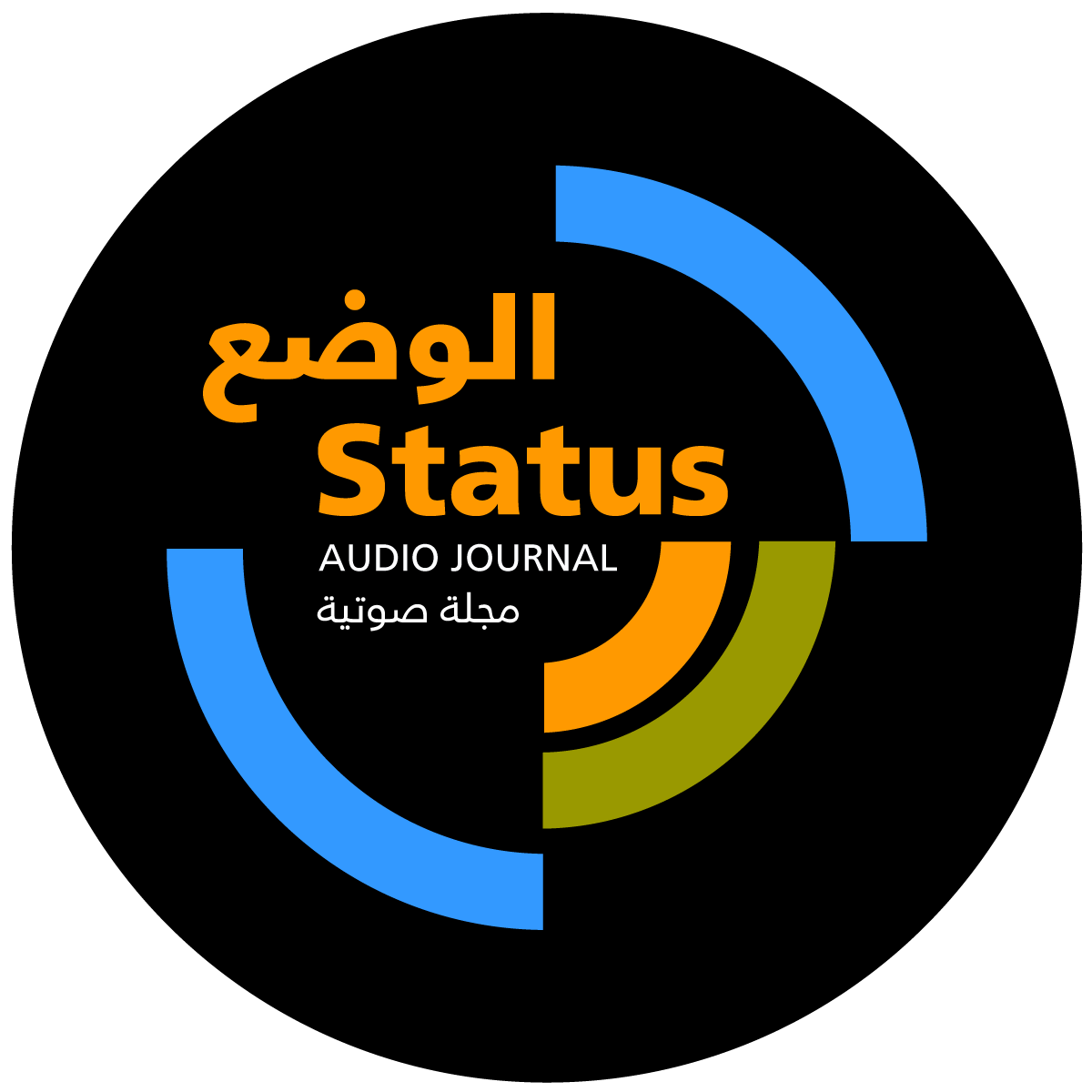In this first issue of 2023, we are thrilled to be introducing new hosts and guests alongside our Status / الوضع household names in an tour de force collection of interviews and content presented in both Arabic and English. The thought-provoking content featured in this extensive issue includes a variety of programs that place critical focus on such topics as Palestinian knowledge production. This issue is especially vital as it coincides with and addresses several landmark incidents in the life of the region in the last months. The Woman, Life, Freedom protest movement in Iran and the devastating tragedy of the earthquake in Turkey and Syria weigh heavily on our team and are signposts for this issue.
(Emancipatory Dialogues) and the manyfold qualms around the media and journalism (Pressing Matter). We’ve also released a large amount of never-before heard content that was recorded at the height of the pandemic. One example of this is a pilot of Booked!, a specialized show about newly published manuscripts that feature exciting conversations with the authors. In the coming months we will be sharing more content similar to this as we expand our reach and deliver more regular programming on Status.
To make our platform more user-friendly, and to help you find content that suits your preferred experience, in Issue 10.1 we ushered in a fresh format for our write-up, which is arranged by country of interest (or “Transnational”).
We hope you will take the time to browse, listen and watch our interviews and discussions here, as well as share these with those who would enjoy this enriching issue of Status / الوضع
Listen, watch, and enjoy at the links below & subscribe on Apple / Spotify!
🇪🇬 Egypt
Booked! Ep. 1 - Cacophonous Cairo[EN]
Host: Adel Iskandar
Guest: Ziad Fahmy
Dr. Ziad Fahmy discusses his 2020 book Street Sounds: Listening to Everyday Life in Modern Egypt from Stanford University Press.
🇵🇸Palestine
Forced Evictions and the Ethnic Cleansing of Palestine[EN]
Host: Malihe Razazan
Guest: Amany Khalifa
On March 1, 2022, the Israeli Supreme Court issued a ruling allowing 4 Palestinian families slated for eviction in East Jerusalem to stay, for now. Palestinian activist Amany Khalifa speaks about the forced expulsion of Palestinians.
Emancipatory Dialogues - Critical intellectual production and problematic Palestinian Factionalism [AR]
Host: Lubaba Sabri
Guest: Abdel Sattar Qassem
In an interview conducted 4 months before his death in 2021, Abdel Sattar Qassem speaks about the pivotal points in his life and the lack of critical knowledge production about Palestine.
Emancipatory Dialogues - Liberation Theology in Palestinian History: Colonialism, Gospel, and Intifada [AR]
Host: Amir Marshi
Guest: Mitri Raheb
In this dialogue, Rev. Mitri Raheb discusses his life as a theologian, thinker, and pastor of a church in Bethlehem.
Emancipatory Dialogues - As Bodies Cross Borders, Emancipatory Thought Crosses Peoples: Critical Knowledge Production According to Isis Nusair [AR]
Guest: Isis Nusair
Prof. Nusair believes that the production of critical knowledge about Palestine can transcend the geographical and national borders of Palestine, and that it is more effective when intersecting with the struggles of other oppressed peoples around the world.
🇮🇷Iran
Protests and Internet Censorship in Iran [EN]
Host: Malihe Razazan
Guest: Amir Rashidi
Massive funds have been invested in technology to monitor the Iranian population, interfere with internet, suppress dissent and cover up the regime's violent suppression of protests. Amir Rashidi spoke with Malihe Razazan about this subject.
Examining the Current Protest Movement in Iran [EN]
Host: Shahram Aghamir
Guest: Nima Tootkaboni
Shahram Aghamir speaks with Nima Tootkaboni, who led an organization called Students for Equality and Freedom in Iran during the 2000s, about the current situation in Iran and how it compares to his experiences in the past.
🇮🇶Iraq
The Long-Term Health Consequences of Exposure to Burn Pits in Iraq [EN]
Host: Malihe Razazan
Guest: Kali Rubaii
In August 2022, U.S. President Joe Biden signed an act expanding benefits and healthcare to U.S. veterans exposed to toxins in burn pits. But what about Iraqi exposure to burn pits? Kali Rubaii's research addresses this vital question.
🇱🇧 Lebanon
October 17 Diary [AR]
Host: Mohamad Ali Nayel
Three years after the uprising and economic collapse that struck Lebanon in Fall 2019, Mohamad Ali Nayel recorded diaries of the experience, with additional voices and music composed to accompany the narration.
🇸🇾 Syria
Syria: Alternative Dialogues, Ep. 0 - Introduction [EN / AR]
Hosts: Bassam Haddad, Omar Dahi, Rabie Nasser
An introduction to this new podcast, which is interested in making the process of producing knowledge more accessible to the Arab world, discussing the importance of investments in integrative networks; and much more.
Flow Podcast Ep. 3 - The Ramifications of the Earthquake in a War-Torn Country: Failure of the International Humanitarian System [EN]
Host: Bassam Haddad
Guests: Omar Dahi, Rabie Nasser, Katty Alhayek, Basileus Zeno
This episode addresses the failure of the relief and rescue efforts in the wake of the earthquake that shook Syria on 6 February, starting with the Syrian regime and ending with the international humanitarian system.
🌐 Misc./Transnational
Two Years of Security in Context [EN]
Hosts: Omar Dahi & Anita Fuentes
Guests: Several
What has Security in Context achieved in the past two years? And what does the future hold for the project? In this episode, we hear from some of the key people leading Security in Context’s research network.
Pressing Matter, Ep. 1 - World Press Freedom Day [EN]
Hosts: Malihe Razazan & Adel Iskandar
Malihe Razazan and Adel Iskandar discuss World Press Freedom Day, established in 1993 by the United Nations to recognize the important service provided by press professionals.
Pressing Matter, Ep. 2 - The Best Top 10 List Ever: How Online Rankings Eviscerate our Agency[EN]
Malihe Razazan and Adel Iskandar discuss how advertising agencies, marketing firms, and digital content producers have used algorithms and automatons to turn our personal choices into predestined behaviors of consumption.
Pressing Matter, Ep. 3 - Al Jazeera’s ‘Rightly’: Journalism Done Wrongly
Hosts: Malihe Razazan & Adel Iskandar
This episode tackles the history of Al-Jazeera, its drive for audiences across contending and, at times, contradictory audience markets, as well as the program “Rightly,” which was phased out less than a year after its launch.


